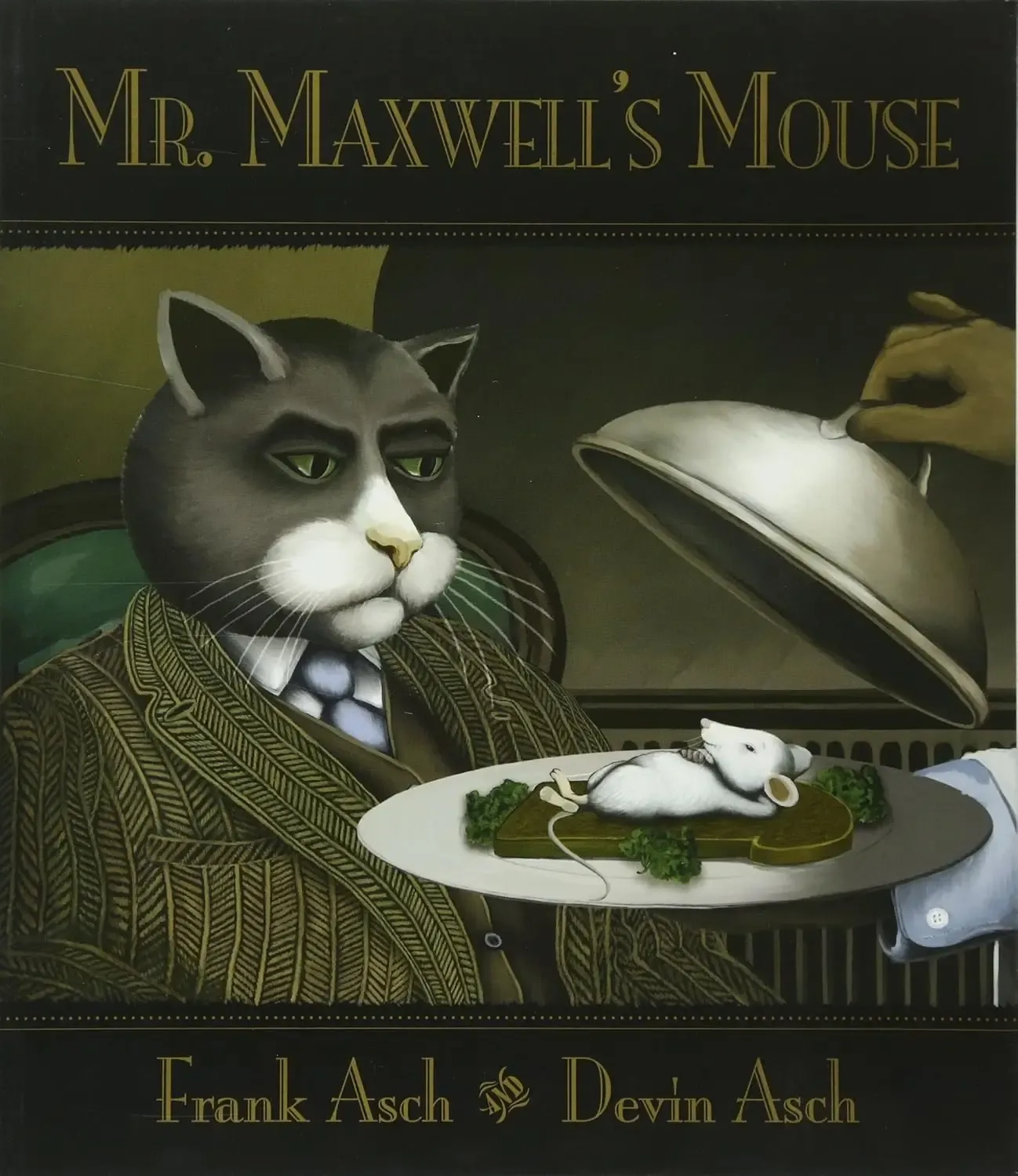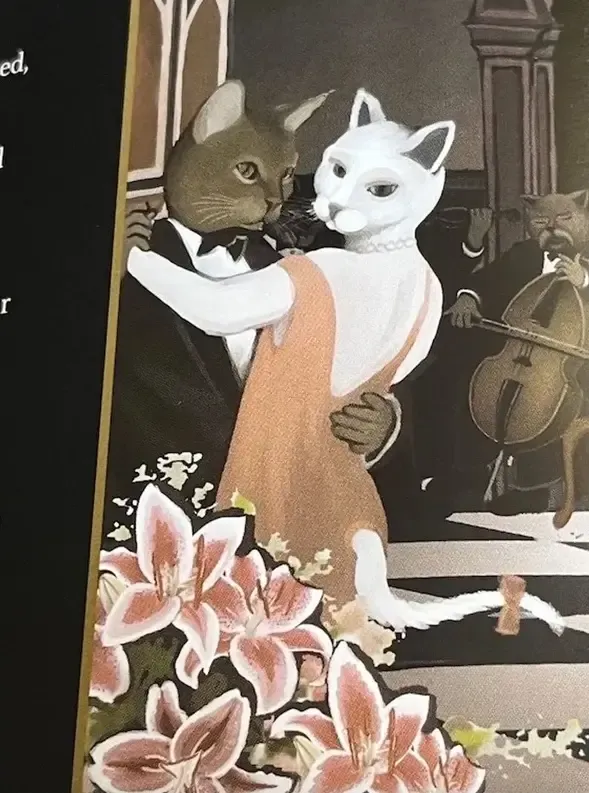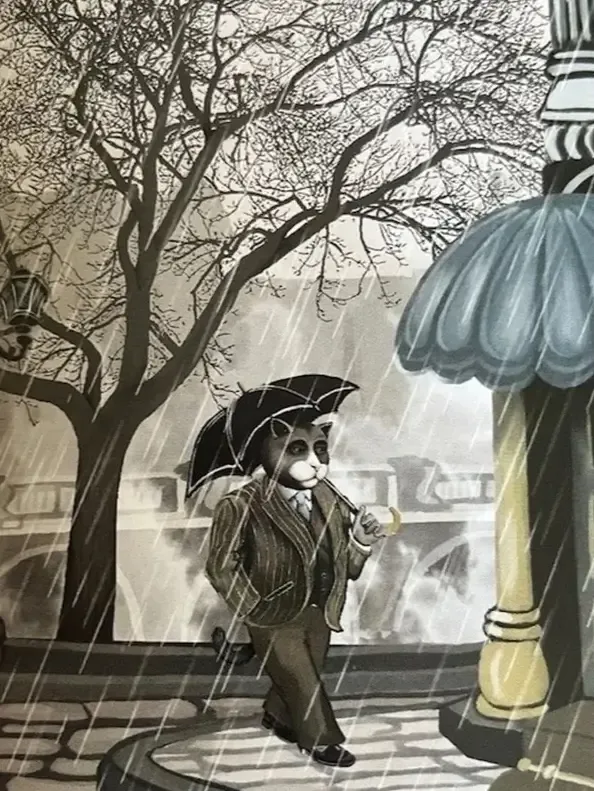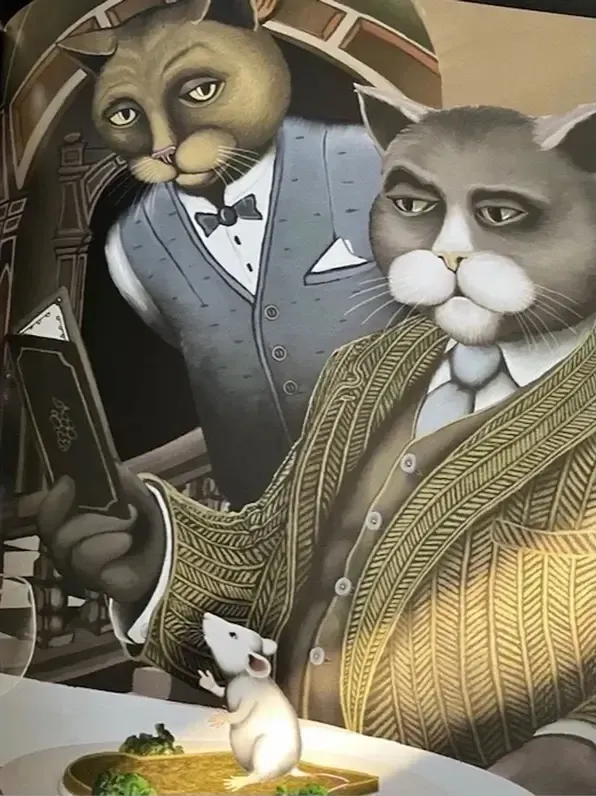Frank Asch’s Mr. Maxwell's Mouse is a darkly witty and sophisticated picture book that skillfully blends humor, tension, and philosophical reflection. Paired with Devin Asch’s moody and richly detailed illustrations, the story offers a layered and somewhat surprising narrative that is equally engaging for older children and adults. Set in a polished, anthropomorphic world where animals take on human-like roles, the book follows the elegant yet morally conflicted Mr. Maxwell, a refined and powerful cat, as he embarks on what he assumes will be an ordinary lunch, only to find that his meal, a clever little mouse, has plans of his own.
The story begins with Mr. Maxwell, a high-ranking businessman and symbol of feline privilege, heading to his favorite restaurant to celebrate a professional victory. He orders a live mouse for lunch, a customary delicacy in this world, intending to enjoy his meal without much thought. However, the mouse he selects is not just any ordinary mouse. This particular mouse is quick-witted, philosophical, and resourceful, immediately engaging Mr. Maxwell in a conversation that subtly shifts the balance of power between predator and prey.
What makes Mr. Maxwell's Mouse stand out is its unique blend of suspense and moral complexity. The seemingly simple premise of a cat about to eat a mouse evolves into a thoughtful, tension-filled exchange between the two characters. The mouse, realizing his impending doom, begins to charm Mr. Maxwell with stories, riddles, and philosophical questions, slowly eroding the cat’s resolve to eat him. This intellectual battle of wits between them adds depth to the narrative, making the book more than just a straightforward tale about survival.
One of the most fascinating aspects of the story is the way it humanizes Mr. Maxwell, despite his role as a predator. As the mouse spins his clever arguments, Mr. Maxwell begins to doubt himself, wrestling with his own ethics and the societal expectations placed upon him as a cat. The mouse’s cleverness forces him to confront his own beliefs about power, control, and the nature of violence. These moments of self-reflection create a compelling dynamic that moves the story beyond a simple predator-prey encounter into the realm of moral ambiguity and inner conflict.
Devin Asch’s illustrations add significantly to the book’s tone and atmosphere. The art is striking, with a palette dominated by deep browns, grays, and muted golds, creating a sophisticated, almost noir-like aesthetic. The images, often featuring close-up shots of Mr. Maxwell’s sleek fur, sharp teeth, and expressive eyes, emphasize the tension between him and the small mouse. The restaurant setting, complete with white tablecloths, polished silverware, and refined decor, contrasts with the primal nature of Mr. Maxwell’s meal, highlighting the absurdity and cruelty that underpins this otherwise civilized world. Every page is meticulously crafted, with attention to detail that invites readers to linger and absorb the richness of the visuals.
The mouse, for his part, is small but incredibly resourceful and confident. His demeanor, rather than being one of sheer panic, is cool and composed as he challenges Mr. Maxwell’s assumptions about the natural order. The conversation between the two characters unfolds with a rhythm that feels both playful and serious, offering readers an experience that is both suspenseful and thought-provoking.
As the story reaches its climax, the tension becomes palpable. Mr. Maxwell, conflicted between his instincts and the mouse’s persuasive arguments, must decide whether to go through with his plan to eat the mouse or spare him. The resolution of this moral dilemma is handled with a light touch, leaving room for interpretation while maintaining the book’s slightly eerie, yet humorous, tone. The book’s ending is unexpected, avoiding the simple resolutions common in many picture books, and instead offering a conclusion that encourages readers to reflect on power dynamics, empathy, and the consequences of our choices.
While Mr. Maxwell's Mouse is marketed as a picture book for children, its dark humor, sophisticated language, and underlying themes make it particularly suited to older readers. Younger children might enjoy the striking illustrations and the basic plot, but it is the older audience, preteens, teens, and adults, who will likely appreciate the book’s deeper philosophical questions and complex character dynamics.
The book doesn’t shy away from the harsh realities of nature or the moral dilemmas that come with power and privilege. In fact, Mr. Maxwell's Mouse serves as a subtle commentary on societal norms, self-control, and the ways in which even the most civilized characters are shaped by their instincts. Frank Asch’s storytelling, combined with the rich, atmospheric illustrations by Devin Asch, creates a powerful reading experience that lingers long after the final page.
Mr. Maxwell's Mouse is a brilliant and layered picture book that offers a blend of humor, suspense, and moral reflection. Its exploration of power dynamics, self-control, and the consequences of our actions makes it a memorable and thought-provoking read for a wide range of audiences. With its elegant writing and stunning illustrations, this book is sure to leave a lasting impression on readers of all ages.
Questions to ask while reading:
- How does the mouse challenge Mr. Maxwell's beliefs and assumptions?
- What do you think the mouse's stories and riddles reveal about his character?
- How does the book explore the themes of power, control, and empathy?





